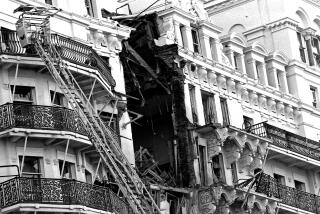IRA Claims Responsibility for Briton’s Death : Car bombing: The outlawed Irish group says the lawmaker was targeted because he was Thatcher’s ‘close confidant.’
- Share via
LONDON — Vowing that it “will continue to strike whenever and wherever the opportunity arises,” the Irish Republican Army on Tuesday claimed responsibility for the car bombing that killed senior British lawmaker Ian Gow and added that the vocal IRA critic was targeted because he was “a close confidant” of Prime Minister Margaret Thatcher.
As police reconstructed bomb fragments and combed hotels, chalets and campgrounds in search of witnesses and possible suspects, the IRA declared in a statement that it will continue the bombings until the British government “abandons its futile military campaign, ends partition (of Ireland) and recognizes the Irish people’s right to self-determination and democracy.”
A grieving Thatcher announced, however, that the government will hold to its hard-line approach to the embattled Irish province. At the same time, Scotland Yard began an intensive review of security for all members of Parliament, who do not qualify for the 24-hour protection provided to British officials residing in Northern Ireland.
The attack on Gow, which occurred in the driveway of his modest country home Monday, was the 12th claimed by the IRA this year and the 17th since it launched its current round of violence last September.
Earlier casualties have included police officers, soldiers and a Roman Catholic nun.
Two men were charged Friday with last week’s murder in Northern Ireland of that nun and three police officers in a land-mine explosion near the Irish border. Henry McCartney, 26, and Tarlac Connolly, 29, both of Armagh, were ordered held until Aug. 17.
Many of the IRA’s bombing sites have been major symbols of Thatcher’s government, among them her Conservative Party’s elite supper club in central London and the London Stock Exchange building.
Gow, however, was the first ruling-party Parliament member killed since the IRA’s bold 1984 bombing at the Brighton Hotel, where Thatcher was conducting a party conference. His murder unleashed a torrent of anger, shock and horror throughout British society Tuesday.
Declaring that Gow’s death was “a direct assault on parliamentary democracy,” a prestigious London daily newspaper, The Independent, stressed, in its lead editorial, the futility of the bombing.
“Like all such murders, yesterday’s was not only repellently heartless but also profoundly stupid,” it declared.
The Times of London, in condemning the killing as part of an IRA “strategy of subversion by terror,” strongly cautioned the government against overreacting. The IRA, the newspaper declared, “would like to see ministers encased in bulletproof armor, railings go up round public buildings, public engagements canceled, Irishmen and women martyred by hanging, free speech curtailed. . . . It wants a Britain consumed by hysterical reaction, a Britain on the run, publicly terrified.”
Thatcher, in an interview with Britain’s Independent Television Network, indicated that the government already is providing as much security as it can.
“It’s not possible to protect everyone, all the time,” she said, still visibly shaken by the killing of a man who had served not only as her private parliamentary secretary but also a close friend to whom she turned for solace. “But I assure you, we do as much as we possibly can--and will continue to do so.”
In its statement Tuesday, the IRA tried to blunt the onslaught of public outrage. “Republicans, all too familiar with suffering, will not rejoice or take pleasure from Ian Gow’s death. We know all grief is the same,” it declared.
At Gow’s home in Hankham, East Sussex, where dozens of floral bouquets were piled high just outside the gate, the victim’s widow issued a statement of her own to the IRA.
“You will never win,” Jane Gow declared in a statement read by a policeman in front of the family home. “We have lost the dearest person in the world, but it will not diminish our resolve to be as strong as he was in fighting this terrible wickedness.”
More to Read
Sign up for Essential California
The most important California stories and recommendations in your inbox every morning.
You may occasionally receive promotional content from the Los Angeles Times.










